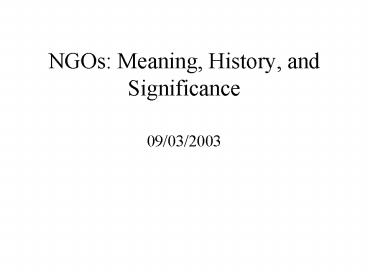NGOs: Meaning, History, and Significance - PowerPoint PPT Presentation
1 / 15
Title:
NGOs: Meaning, History, and Significance
Description:
Fiscal crisis: budget cut, slow economy, economic recession. The End of Cold War ... Economic globalization. Political globalization. NGO Challenges ... – PowerPoint PPT presentation
Number of Views:1707
Avg rating:3.0/5.0
Title: NGOs: Meaning, History, and Significance
1
NGOs Meaning, History, and Significance
- 09/03/2003
2
Class Outline
- The meaning of NGOs Nongovernmental
organizations - NGO characteristics
- Different types of NGOs
- History of NGOs
- Reasons for the current growth of NGOs
- NGO and globalization
- Challenges and responses
3
Meaning of NGO
- Formal institutionalized
- Private nongovernmental
- Self-governing
- Exhibition of altruistic value and ideologically
driven - Nonprofit distributing
- Development oriented
4
Different Types of NGOs
- By location
- I. Northern NGOs or international NGOs
- - western industrialized countries
- - national, multinational, fully multinational
- II. Southern NGOs or local, indigenous NGOs
- low income, aid recipient countries
- less developed areas
5
SNGOs
- National NGOs or GRSOs
- intermediary organizations
- Professionally staff, nationally based, educated
middle class - Bureaucratic org
- Externally funded
- GROs
- known as CBOs or Pos
- Membership orgs
- Community oriented
- Small self-help orgs
- Run by volunteers
- Locally based
6
By NGO Purpose
- Supply-Side NGOs
- Welfare oriented NGOs
- Provide services directly to local community
- Rely on volunteers and staff
- CARE, Plan International, MSF
- Demand-Side NGOs
- Advocacy/lobbying work
- Advance beliefs and ideologies
- Seek to influence public policy
- the Interaction and Steering Committee for
Humanitarian Response (SCHR)
7
Evolution of NGOs
- Lindenberg Bryant
- NNGOs
- Based on org structure, production of services,
and governance - National NGOs MSF France
- Multinational NGOs Mercy Corps
- Fully multinational NGOs CARE, SCF, Plan
- David Korten
- Four-Generation NGOs
- First generation welfare oriented
- Second generation sustainable, self-help orgs
- Third generation advocacy, structural change
- Fourth social movement
8
History of INGOs
- I. Emergence 1775-1918
- National issues slave trade, peace movement,
labour rights - Humanitarian relief for war victims and refugees
- II. Engagement 1920 to 1940
- raising awareness of international issues
- Interacting with governments
- III. Disengagement 1941-1944
- Humanitarian and emergency for war victims
- Growing hostility
- Inhibited NGO participation
- IV. Formalization 1945-late 1960s
- recognition by international agencies
- No real cooperation
9
NGO History
- V Late 1960s-1970s Quite Growth
- Gov as recipient of international aid
- Gov as the engine of development
- Prevalence of TNCs
- Mutual mistrust
- NGO presence was tolerated
- VI 1980s Limited contribution of NGOs
- Reagan and Thatcher era
- Market as the engine of growth
- Dominance of institutional donors
- Donor-led development
- Development of NGO cooperation with official aid
system
10
NGO History
- VII 1990s Favored Child
- alternative model of development (people-centered
model) - NGOs as the preferred mechanism of development
- Failure of past efforts
- Evidence of NGO growth
- Gained access to policymakers
- VIII 2000-current Self-examination
- critical path of NGOs
- Welfare providers for official aid system or
advocacy organizations - Fundamental values and roles of NGOs in
development
11
NGO-Growth Factors
- Fiscal crisis budget cut, slow economy, economic
recession - The End of Cold War
- The Third Wave of Democratic Opening
- An increasing use of public bilateral and
multilateral resources - Privatization
- Change in ideology The New Policy Agenda
- Growing demand
12
Globalization Challenges
- 2. New Form of Global Poverty
- 3. Declining capacity of national governments
- 4. Weak and outmoded global institutions
- 5. New pressure for accountability and efficiency
- 6. New pressures to respond globally
- 7. Recreating purpose and mystique
- 3 aspects of globalization
- Social globalization
- Economic globalization
- Political globalization
- NGO Challenges
- 1.New Waves of Complex Emergencies
13
Internal Response Needed
- Reexamine our values
- Create a new vision and mission
- Design new relief and development programs
- Transform organizational culture
- Increases accountability
- Build global networks for services, fundraising,
and advocacy - Restore meaning in organizational work
14
Variables in Managing Change
- Stakeholder review
- Staff morale and issues
- Partnership choices
- Program review problems/possibilities
- Financial/base/options for change
- Donors roles and relationships
- A learning organization
15
Progress and Bumps in the Road
- Progress
- Mission and values
- Relief and development programming
- Service and Support systems
- National Boards and global family governance
- Partnership beyond the family
- Bumps
- Middle managers
- Structure of NGO families
- Donor pressure
- Unpredictable external environment
- Staff motivation and organizational culture

